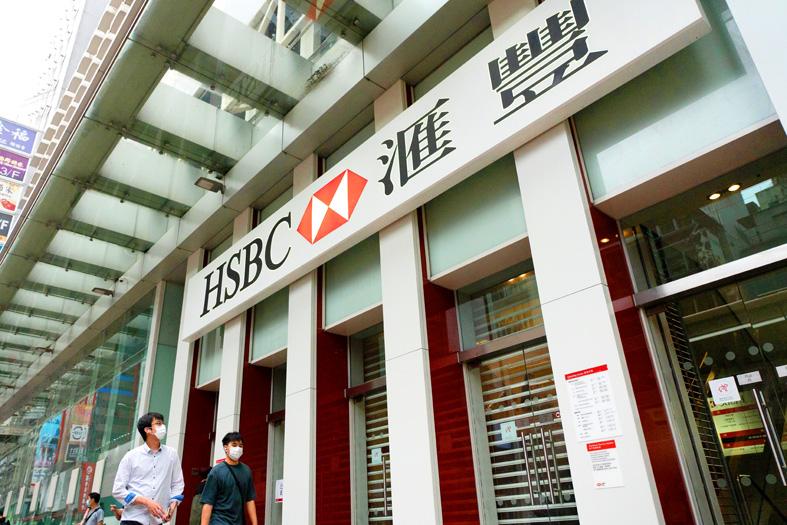HSBC Bank Taiwan Ltd (匯豐台灣商銀) holds an upbeat outlook about the growth of sustainability-linked loans (SLL), because higher electricity rates would provide a new incentive for companies to reduce power use, the bank told the Taipei Times in an interview.
The higher electricity rate took effect yesterday.
The amount of SLLs approved by HSBC Bank Taiwan grew eight times year-on-year in the first half of this year, the bank said without disclosing the figure.

Photo: Bloomberg
SLLs are different from regular corporate loans in that the debtor needs to set a few targets related to its environment, social and governance (ESG) practices with the bank and if the debtor meets the targets, it would be granted rewards such as discounts on the interest rate.
HSBC Bank Taiwan usually requires its clients that hope to take out a SLL to set three targets and at least 80 percent of the targets are related to environmental issues, such as power consumption and waste water management, commercial banking head Stanley Hsiao (蕭仲程) said in the interview.
With the electricity rate for heavy industrial users rising 15 percent yesterday, many companies would be incentivized to review their manufacturing processes to see whether there is room for reducing power use to save on electricity bills, Hsiao said.
SLLs would be suitable for these firms, as they could set targets for power conservation and once they meet the targets, they would obtain financial rewards, he said.
Although SLLs are often associated with green loans, the two types of loans are fundamentally different because the bank does not restrict the use of the proceeds of SLLs to environmental projects, Hsiao said.
SLLs are more like short-term corporate loans and perhaps because of the comparative flexibility in the use of the funds, they have expanded more rapidly than green loans worldwide, he said, adding that the growth rate is 400 percent to 800 percent.
“Among all our funding linked with the ESG concepts, green loans make up about only 10 percent, while SLLs account for about 80 percent,” Hsiao said.
Meanwhile, HSBC Bank Taiwan is considering reviewing its SLL mechanism to encourage corporate clients to set more challenging targets, he said.
“Currently, one year after we approve the loan, we review whether the debtor has met the targets, but we are also thinking about more challenging targets that might not be reached in one year,” Hsiao said.

CHIP WAR: Tariffs on Taiwanese chips would prompt companies to move their factories, but not necessarily to the US, unleashing a ‘global cross-sector tariff war’ US President Donald Trump would “shoot himself in the foot” if he follows through on his recent pledge to impose higher tariffs on Taiwanese and other foreign semiconductors entering the US, analysts said. Trump’s plans to raise tariffs on chips manufactured in Taiwan to as high as 100 percent would backfire, macroeconomist Henry Wu (吳嘉隆) said. He would “shoot himself in the foot,” Wu said on Saturday, as such economic measures would lead Taiwanese chip suppliers to pass on additional costs to their US clients and consumers, and ultimately cause another wave of inflation. Trump has claimed that Taiwan took up to

A start-up in Mexico is trying to help get a handle on one coastal city’s plastic waste problem by converting it into gasoline, diesel and other fuels. With less than 10 percent of the world’s plastics being recycled, Petgas’ idea is that rather than letting discarded plastic become waste, it can become productive again as fuel. Petgas developed a machine in the port city of Boca del Rio that uses pyrolysis, a thermodynamic process that heats plastics in the absence of oxygen, breaking it down to produce gasoline, diesel, kerosene, paraffin and coke. Petgas chief technology officer Carlos Parraguirre Diaz said that in

Japan intends to closely monitor the impact on its currency of US President Donald Trump’s new tariffs and is worried about the international fallout from the trade imposts, Japanese Minister of Finance Katsunobu Kato said. “We need to carefully see how the exchange rate and other factors will be affected and what form US monetary policy will take in the future,” Kato said yesterday in an interview with Fuji Television. Japan is very concerned about how the tariffs might impact the global economy, he added. Kato spoke as nations and firms brace for potential repercussions after Trump unleashed the first salvo of

SUPPORT: The government said it would help firms deal with supply disruptions, after Trump signed orders imposing tariffs of 25 percent on imports from Canada and Mexico The government pledged to help companies with operations in Mexico, such as iPhone assembler Hon Hai Precision Industry Co (鴻海精密), also known as Foxconn Technology Group (富士康科技集團), shift production lines and investment if needed to deal with higher US tariffs. The Ministry of Economic Affairs yesterday announced measures to help local firms cope with the US tariff increases on Canada, Mexico, China and other potential areas. The ministry said that it would establish an investment and trade service center in the US to help Taiwanese firms assess the investment environment in different US states, plan supply chain relocation strategies and